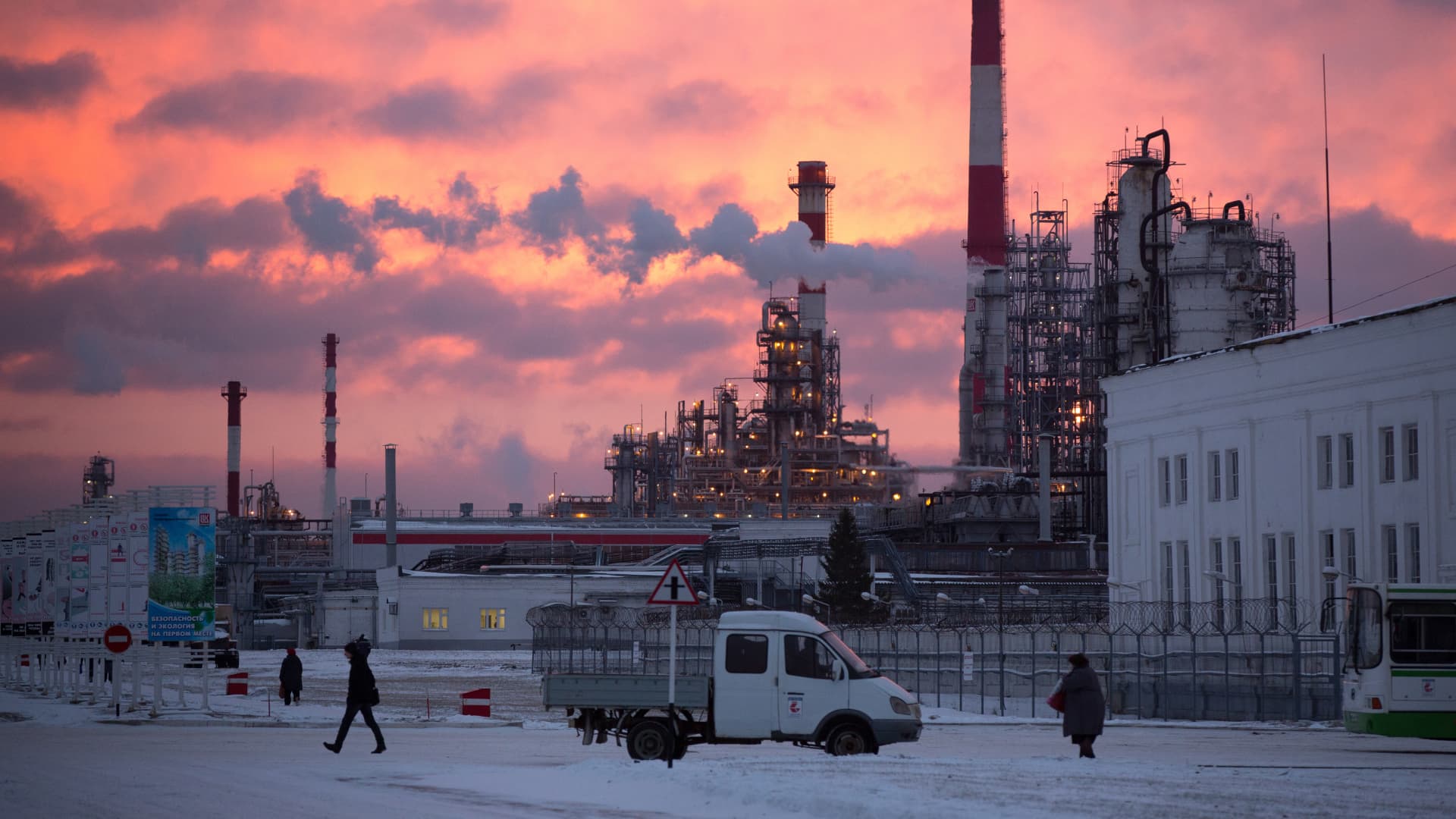This was CNBC’s live blog tracking developments on the war in Ukraine.
Russia’s defense ministry claimed it had “thwarted” an armed incursion by Ukrainian armed forces and “sabotage and reconnaissance groups” into its western border regions of Kursk and Belgorod Tuesday.
Earlier, anti-Kremlin armed groups purportedly made up of Russians opposed to the Ukraine war said they had launched an incursion across Russia’s border on Tuesday.
Ukraine has not commented on the Russian defense ministry’s latest claim although an Ukrainian military spokesman confirmed earlier that rebel groups were conducting an operation on Russian territory independently of Ukraine.
It’s unconfirmed whether Ukraine’s armed forces were also involved in the incursion, as Russia suggested. Russia tends to characterize Russian rebel groups are “Ukrainian saboteurs.”
The Ukraine-based Freedom of Russia Legion and the Siberian Battalion announced earlier on their Telegram pages that they had launched attacks into Russia from Ukraine. They said they intended to “take our land away from the [Putin] regime, centimeter by centimeter” and called on Russians to boycott the forthcoming presidential election.
A third Russian rebel group, the Russian Volunteer Corps, appeared to confirm its participation in the operation on its Telegram account.
It’s not the first time the groups have been active with two of the pro-Ukrainian Russian rebel groups launching raids into Russia’s Belgorod region last May and June.
Roman Starovoit, the governor of Russia’s Kursk region, which is on the border with Ukraine, said earlier Tuesday that a “sabotage and reconnaissance group” had tried to break into the Kursk region but failed.
Earlier, Russia’s defense ministry said seven regions were targeted by a wave of Ukrainian drones overnight, with attacks carried out against the Belgorod, Bryansk, Kursk, Leningrad, Moscow, Oryol and Tula regions.
Russian assets, frozen in the European Union after Moscow’s invasion of Ukraine, are likely to generate between 15 billion and 20 billion euros in after-tax profits until 2027, depending on the evolution of global interest rates, a senior EU official said.
Part of the profits, as well the tax on the gross amount, is likely to be transferred from the EU to Kyiv on a regular basis, but some of the money will have to stay in the West to build a buffer against the expected Russian retaliation which could destabilise the global financial system, the official said.
Some 70% of all Russian assets immobilised in the West is held in the Belgian central securities depository Euroclear, which has the equivalent of 190 billion euros worth of various Russian central bank securities and cash.
“We want to help Ukraine, but we will also have to ensure that there is no breach of financial stability,” said the EU official, who is close to negotiations on the use of the assets.
“The moment the war ends and all settlements can be made, all the money that was provisionally retained will also be transferred to Ukraine. But we need a significant amount in Euroclear…because Euroclear will face a lot of claims,” the official said.
The claims are to come from the Russian central bank which, through Russian courts that do not recognise Western sanctions, is likely to put its hands on the 33 billion euros of Euroclear money in the national securities depository in Moscow.
Russia could also take legal action to seize Euroclear cash in securities depositories in Hong Kong and Dubai, the official said, and more lawsuits against are likely from Western banks which lost their money invested in Russia, the official said.
— Reuters
Denmark on Tuesday announced a new aid package for Ukraine which covers ammunition and other military support and is worth around 2.3 billion Danish krone ($336.6 million).
“Artillery and mortar systems are in great demand by Ukraine. With this donation package, we are delivering a substantial contribution to the Ukrainian freedom struggle in the form of both additional CAESAR artillery systems and accompanying ammunition,” Danish Defence Minister Troels Lund Poulsen said in a statement, according to a Google Translation.
The aid package will be financed in collaboration with allies, the statement said.
— Sophie Kiderlin
A Ukrainian drone has reportedly crashed into a city hall building in the Russian city of Belgorod. Two people were injured in the incident, Belgorod’s Governor Vyacheslav Gladkov wrote on Telegram Tuesday.
“In Belgorod, an enemy UAV [unmanned aerial vehicle] crashed into the city administration building. There are two casualties: one woman received shrapnel wounds, the second received a concussion,” he said.
“As a result of the explosion, windows in the building were shattered and [the] facade damaged. All emergency services are on site,” he said, according to a NBC translation of his comments. CNBC was unable to immediately verify the information.
Russia said earlier Tuesday that Ukraine had launched drones and missiles against seven Russian regions, including the border region Belgorod, with energy infrastructure among the main targets. It said its air defenses had shot down 25 drones. Ukraine has not commented on the attacks.
— Holly Ellyatt
Ukraine pounded targets in Russia on Tuesday with dozens of drones and rockets in an attack that inflicted serious damage on a major oil refinery and sought to pierce the land borders of the world’s biggest nuclear power with armed proxies.
Russia and Ukraine have both used drones to strike critical infrastructure, military installations and troop concentrations in their more than two-year war, with Kyiv hitting Russian refineries and energy facilities in recent months.
Russia said Ukrainian proxies had sought to cross the Russian border in at least seven attacks that Russian forces had repelled. The Russian-speaking Ukrainian proxies said they had breached the border, a claim denied by Russia.
In one of the biggest Ukrainian drone attacks on Russia to date, Moscow said it downed 25 Ukrainian drones over regions including Moscow, Leningrad, Belgorod, Kursk, Bryansk, Tula and Oryol. Waves of drone attacks continued through the day, the defence ministry said.
Russian officials reported attacks on energy facilities, including a fire at Lukoil’s NORSI refinery and a drone destroyed on the outskirts of the town of Kirishi, home to Russia’s second largest oil refinery.
Gleb Nikitin, governor of the Nizhny Novgorod region, posted a picture of a fire truck beside the NORSI refinery and said emergency services were working to put out a blaze there.
Striking Russian oil facilities is a problem for President Vladimir Putin as he faces off against the West over Ukraine, with domestic gasoline prices sensitive ahead of a March 15-17 presidential election.
— Reuters
Schools in the Russian city of Kursk are switching to online classes after an alleged Ukrainian incursion into the wider border region Tuesday.
The Mayor of Kursk Igor Kutsak said on Telegram he’d made the decision to introduce distance learning over the next few days “in connection with recent events.”
Ukraine-based armed groups claimed on Tuesday they had crossed the border into Russia although Russia’s defense ministry claimed that it had thwarted an attempted incursion by Ukraine’s armed forces and “sabotage and reconnaissance groups” into the Kursk and Belgorod regions.
Kursk’s governor said the region had been attacked by Ukrainian drones overnight and later said the border village of Tettkino was being shelled. Ukraine has not officially commented on the alleged incursion or attack.
— Holly Ellyatt
Russian armed forces claim to have taken control of the village of Nevelske in the eastern Ukrainian region of Donetsk.
Russia’s Ministry of Defense said in a statement that its troops now occupied “more advantageous lines and positions” in the area following the village’s capture, the latest in a series of military gains following the capture of industrial city Avdiivka last month.
The ministry said Russian armed forces had defeated Ukrainian formations in the areas of Novomykhailivka in Donetsk and Bilohorivka in Luhansk. It claimed Ukraine had lost up to 350 soldiers, two tanks, four cars and a Gvozdika self-propelled artillery unit in one day of combat.
Ukraine has not commented on, or confirmed, Russia’s claim.
— Holly Ellyatt
A Russian Il-76 military transport plane has reportedly crashed in the Ivanovo region northeast of Moscow on Tuesday with 15 people on board.
The plane was taking off for a scheduled flight when one of the engines caught fire, causing the plane to crash, news agency TASS reported, citing information from Russia’s defence ministry.
There were eight crew members and seven passengers on board the plane. It’s unclear whether there were any survivors and an investigation is underway.
— Holly Ellyatt
Russia’s Defense Ministry said its armed forces and border units have thwarted an attempted incursion by Ukrainian forces — as well as “Ukrainian sabotage and reconnaissance groups” — into the border regions of Kursk and Belgorod on Tuesday.
“This morning, units of the Armed Forces of the Russian Federation, together with units of the border service of the FSB of Russia, thwarted an attempt by the Kiev regime to infiltrate the border territory of the Russian Federation in the Belgorod and Kursk regions,” the ministry said in a statement, according to an NBC News translation.
“Around 3 a.m. Moscow time, after intense shelling of civilian targets, Ukrainian terrorist formations, supported by tanks and armored combat vehicles, attempted to simultaneously invade the territory of the Russian Federation in three directions in the areas of the settlements of Odnorobovka, Nekhoteevka and Spodaryushino, Belgorod region,” the statement said.
It said all the attacks, which it said were carried out by the Ukrainian armed forces, “were repelled by the selfless actions of Russian military personnel. The enemy was struck by aviation, missile forces and artillery,” the ministry said.
It claimed Ukraine had suffered “significant” losses in the attack and had been driven back and that the border was secure.
“In the border area on the Ukrainian side, up to 60 Ukrainian terrorists were killed in the Odnorobovka area, three tanks and an armored personnel carrier were destroyed in the Nekhoteevka area, and two tanks were destroyed in the Spodaryushino area,” it said.
The statement comes after three anti-Kremlin armed groups said they had launched an incursion across Russia’s western border, without providing further detail.
Russia’s Defense Ministry said Tuesday that, in addition, “four attacks by Ukrainian sabotage and reconnaissance groups that tried to cross over into the border territory near the village of Tyotkino, Kursk region, were repelled.”
“Having suffered significant losses, the enemy was driven back,” the ministry claimed.
— Holly Ellyatt
A Russian official confirmed Tuesday that pro-Ukrainian, Russian armed groups had attempted to launch an incursion into the Kursk region that borders Ukraine.
Kursk Governor Roman Starovoit stated on his Telegram channel that a Ukrainian “sabotage and reconnaissance group” had tried to break into the Kursk region but failed.
“Since the morning there has been shelling of the settlement of Tyotkino in the Glushkovsky district. There was an attempt to break through by a sabotage and reconnaissance group, there was a shooting battle, but there was no breakthrough,” the head of the region said in a video message reported by RIA Novosti and translated by Google.
The Glushkovsky district is one of the six border districts of the Kursk region and is regularly subject to shelling from Ukraine, RIA Novosti noted. Kyiv tends not to comment on attacks it carries out against Russian territory, but there have been numerous instances of drone and shelling attacks. Kursk is on a yellow or “high” terror alert level.
Starovoit did not name the group allegedly involved in the incursion and CNBC was unable to immediately confirm the reports.
However, earlier on Tuesday, Reuters cited at least two Ukraine-based armed groups — purportedly made up of Russians opposed to the war and the Kremlin — that claimed they launched an incursion across Russia’s western border on Tuesday, according to their social media pages.
Russia’s Defense Ministry said Tuesday that Ukraine’s military had tried to attack the Kursk region, and a number of other Russian regions, with drones. It said its air defense systems had intercepted and destroyed 11 drones over the Kursk region, seven over the Belgorod region, two each over the Moscow and Oryol regions, and one each in the Leningrad, Bryansk and Tula regions.
— Holly Ellyatt
At least two Ukraine-based armed groups purporting to be made up of Russians opposed to the Kremlin launched an incursion across Russia’s western border on Tuesday, according to their social media pages.
The Freedom of Russia Legion and the Siberian Battalion both announced on their Telegram pages that they had launched attacks into Russia from Ukraine.
“We will take our land from the regime centimetre by centimetre,” the Freedom of Russia Legion said in its Telegram post. Reuters could not independently verify the claims.
Russian officials could not be immediately reached for comment on the claims on Tuesday.
In the past, Russian officials have cast the groups as puppets of the Ukrainian military and U.S. Central Intelligence Agency, which Moscow says is trying to foment chaos in Russia.
Andriy Yusov, a spokesperson for Ukraine’s military intelligence, told Ukraine’s 24 Channel the groups were conducting the operation on Russian territory independently of Ukraine.
Yusov said a third group, the Russian Volunteer Corps, was also participating in the operation.
The legion’s post appeared to refer to the upcoming Russian election, which will take place this weekend. “The people will vote for whom they want, not for whom they have to. Russians will live freely,” the group said.
The Freedom of Russia legion and the Russian Volunteer Corps have previously claimed responsibility for other cross-border raids into Russia from Ukraine.
— Reuters
Russia began a series of joint naval drills with its allies China and Iran on Tuesday, and the West is likely to watch the exercises closely.
The naval exercise, taking place under the “Maritime Security Belt-2024” title, are taking place in the Gulf of Oman, Russia’s Defense Ministry said on Telegram.
“A detachment of warships of the Pacific Fleet, consisting of the guards missile cruiser ‘Varyag’ and the frigate ‘Marshal Shaposhnikov’ began practicing practical tasks of the joint international naval exercise “Maritime Security Belt 2024″ with ships of the Iranian and Chinese navies,” the defense ministry said.
The main goal of the naval drills “is to improve the safety of maritime economic activity,” Russia said.
“During the exercise, warships of the three countries will perform joint maneuvers and fire at surface and air targets, and will also practice elements of freeing a ship captured by pirates.”
In total, more than 20 ships, support vessels and combat boats of the Russian Navy, the Iranian and Chinese Navy are involved in the exercise. Naval helicopters will also be widely used, the defense ministry added.
It’s the sixth time the countries have held the joint exercise, but it’s likely to be closely watched by the West given the deepening relationship between Russia, Iran and China and heightened tensions with the West.
Representatives of the navies of Pakistan, Kazakhstan, Azerbaijan, Oman, India and South Africa will take part in the exercise as observers for the first time, Russia said.
The first condition for any negotiations to end the war in Ukraine is that Russia should halt its aggression, the second in command to Pope Francis said in a newspaper interview on Tuesday.
Ukraine’s Foreign Ministry summoned the papal nuncio on Monday to express “disappointment” with previous comments by Francis that Ukraine should “show the courage of the white flag” and open talks with Russia to end the two-year-old war.
Cardinal Pietro Parolin, the Vatican’s secretary of state, told Corriere della Sera daily on Tuesday that the Vatican was pressing for a cease-fire and “first of all it should be the aggressors who stop firing.”
— Reuters
Russian authorities said seven regions were targeted by a wave of Ukrainian drones overnight, with attacks carried out against the Belgorod, Bryansk, Kursk, Leningrad, Moscow, Oryol and Tula regions.
Air defense systems destroyed and intercepted 25 Ukrainian drones (also known as UAVs, unmanned aerial vehicles) overnight over the regions, the Russian Ministry of Defense said, according to a statement published by the Tass news agency.
“Tonight, an attempt by the Kiev regime to carry out a terrorist attack using 25 aircraft-type UAVs on objects on the territory of the Russian Federation was stopped,” the ministry said in a statement reported by Tass.
“Air defense systems on duty intercepted and destroyed over the territories of Moscow (2 UAVs), Leningrad (1 UAV), Belgorod (7 UAVs), Kursk (11 UAVs), Bryansk (1 UAV), Tula (1 UAV) and Oryol (2 UAVs) regions,” the department said.
In a separate report, Tass cited the defense ministry as saying it had foiled a separate attempt to target the border region of Belgorod with missiles and shelling. “Russian air defense forces shot down one Tochka-U missile and eight shells of the RM-70 Vampire multiple launch rocket system of the Ukrainian Armed Forces over the Belgorod region, the Ministry of Defense reported,” Tass said.
In a separate report, the governor of the Nizhny Novgorod region, Gleb Nikitin, said Russian energy infrastructure had been targeted in the region.
“In the morning, the Kstovo industrial zone, a fuel and energy complex facility, was attacked by unmanned aerial vehicles. Now the special services are working on the spot, using all the necessary forces and means to localize the fire at one of the oil processing plants,” he said on his Telegram channel.
CNBC was unable to immediately verify the claims and Ukraine has not commented on these latest alleged attacks. Ukraine has repeatedly targeted Russian territory with drones on previous occasions, however, particularly targeting energy and fuel infrastructure, such as oil refineries.
— Holly Ellyatt
NATO held its accession ceremony for Sweden, the 32nd member of the transatlantic Western alliance, which officially joined last week nearly two years after it first bid to join the organization.
The Swedish flag was raised at NATO headquarters in Brussels, Belgium, for the first time as Secretary General Jens Stoltenberg and Swedish Prime Minister Ulf Kristersson gave remarks.
“Sweden brings high-end capabilities, first-class military forces, and spends more than 2% of GDP on defense,” Stoltenberg said.
“Sweden’s accession shows again that NATO’s door remains open. No one can close it. Sweden has taken its rightful place at NATO’s table under the shield of Article 5 protection – the ultimate guarantee of our freedom and security. All for one and one for all.”
In separate remarks, Stoltenberg said that Ukraine is “closer to NATO membership than ever before.”
— Natasha Turak
Russia is manufacturing triple the number of artillery shells for its military than the U.S. and Europe are producing for Ukraine, a report by CNN says.
“Russia is producing about 250,000 artillery munitions per month, or about 3 million a year,” the report said, citing NATO intelligence estimates.
The U.S. and Kyiv’s allies in Europe meanwhile have the capacity to produce roughly 1.2 million munitions annually to send Ukraine, it said.
“The U.S. military set a goal to produce 100,000 rounds of artillery a month by the end of 2025 — less than half of the Russian monthly output,” it added.
That figure could now fall as Congress stalls on approving more military aid for Kyiv.
— Natasha Turak
Belarus is launching an inspection to assess the combat readiness of its armed forces, the country’s defense ministry announced on Telegram.
“The Armed Forces have begun checking the combat readiness of military formations and units,” the ministry wrote in its post, according to a Google translation from Russian. “The check is comprehensive. The personnel will have to move to designated areas and conduct a series of exercises and training, including live fire.”
It said that the inspection will entail the movement of military equipment, and that civilian transport and movement on public areas and roads may as a result be restricted.
Belarus is one of Russia’s closest allies, and its longtime President Alexander Lukashenko has provided Russia with logistical support and training grounds for its soldiers throughout Moscow’s full-scale invasion of Ukraine.
— Natasha Turak
Sweden’s accession to the NATO alliance, made official last week, shows President Vladimir Putin has failed in his aim to weaken Ukraine, NATO Secretary General Jens Stoltenberg said during the official ceremony for the Nordic country’s membership.
“When President Putin launched his full-scale invasion two years ago, he wanted less NATO and more control over his neighbors. He wanted to destroy Ukraine as a sovereign state, but he failed,” Stoltenberg said, standing alongside Swedish Prime Minister Ulf Kristersson in Brussels ahead of the raising of Sweden’s flag outside NATO’s headquarters.
“NATO is bigger and stronger,” he added.
Sweden first bid to join the military alliance, ending its historically nonaligned position, in May 2022 in the wake of Russia’s invasion of Ukraine. However, the country’s accession was held up by member states Turkey and Hungary. Hungary only last month voted in favor of the country joining the alliance.
— Natasha Turak
Former U.S. President Donald Trump will “not give a penny” to Ukraine for its war with Russia if he is re-elected, Hungarian Prime Minister Viktor Orban said on state television after meeting with Trump in Florida.
“He will not give a penny into the Ukraine-Russia war and therefore the war will end, as it is obvious that Ukraine on its own cannot stand on its feet,” Orban said on Sunday evening.
“If the Americans do not give money and weapons, and also the Europeans, then this war will be over. And if the Americans do not give money, the Europeans are unable to finance this war on their own, and then the war will end.”
Orban has long held friendly relations with Russian President Vladimir Putin, refusing to send weapons to Ukraine and maintaining active economic ties with Moscow despite EU sanctions. He met with Putin last October in China, despite criticism from other European leaders.
— Natasha Turak
Swedish flag is raised over NATO headquarters for the first time; Pope Francis’ ‘white flag’ call for Ukraine faces backlash






